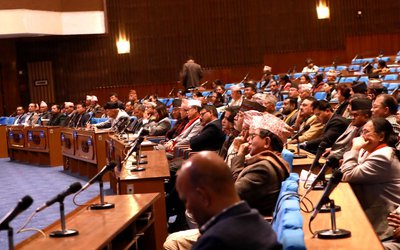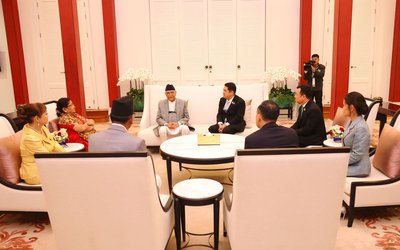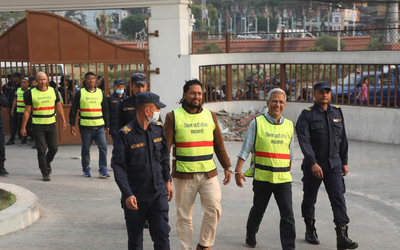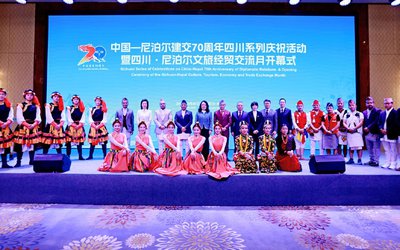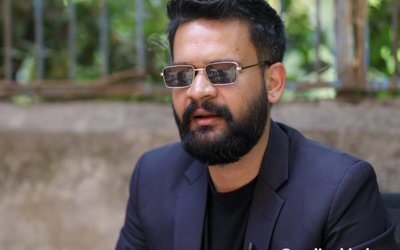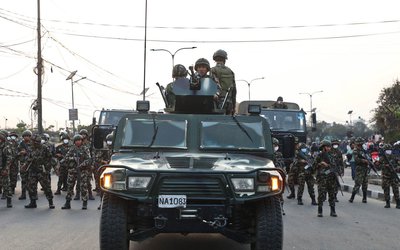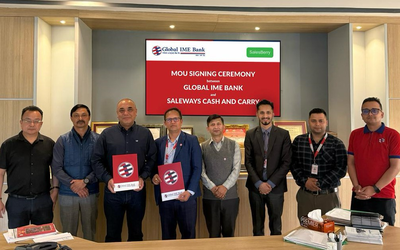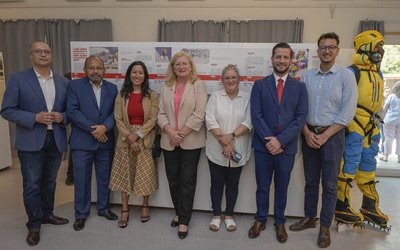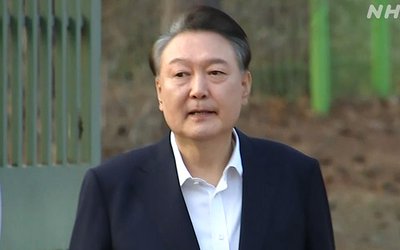
Nepal hosted its first ever Girl Summit as part of its commitment, following the 2014 London Girl Summit, to end child marriage by 2030 . The event was opened by lighting a traditional lamp by President Bidhya Devi Bhandari with Prince Harry of the United Kingdom looking on. It brought together young people, community members, activists, religious leaders, government officials, diplomats, UN and civil society to accelerate momentum in ending Child, Early and Forced Marriage.
The one-day Girl Summit hosted by the Ministry of Women, Children and Social Welfare (MoWSCW), with technical and financial support provided by DFID and UNICEF, was a culmination of weeks of preparations. District Level Consultations for the event began on March 3rd in 15 districts of Nepal, and brought together girls and boys and to discuss challenges and solutions for eradicating child marriage in Nepal and creating the conditions for every girl to reach her full potential. Interactions between these adolescents and community leaders were also held in these 15 districts, which provided additional platform for adolescent girls and boys to voice their issues.
Nearly half of all women in Nepal between the ages of 20 and 49 were married before their 18th birthday, of these, 15 per cent were not even 15 years old at the time of marriage. It was to end this harmful practice that infringes on the rights of girls as well as boys, that the Government of Nepal in 2014 pledged to end child marriage by 2030. MoWCSW has rolled out a special adolescent Girls Empowerment Program to achieve this. The Girl Summit, the first event of its kind in Nepal, is part of the Government's commitment to end child marriage, and represents an important step in changing gender relations in the country and empowering women and girls to unlock their potential.
Following the lighting of the inaugural traditional lamp by President Bhandari and a special symbolic cultural performance by adolescent girls, special guest Prince Harry spoke with optimism about the opportunity opening up in Nepal where in the past decade the incidence of child marriage has seen a slide. "I recognise that each country must find its own path; and that here in Nepal, this is a complex social challenge. But it is one that the Government is tackling and is making progress in its hope of ending child marriage by 2030; it has fallen by 10 per cent over the last decade and the practice is now banned by law. Therefore the focus can now turn toward enforcement and education."
Talking about the need for more men to speak about this issue, he added," Female leadership in Nepal now sets a powerful example, with women occupying the roles of President and Speaker. But the biggest reason for our optimism are the inspiring girls and boys in this room who care so much about changing attitudes towards young women in this country. I am proud to stand with you today."
Speaking on behalf of adolescents in the country, Radhika Budha, a 15-year old from Kalikot district from the far western corner of the country, said "Like in many parts of the world, including Nepal, child marriage is common in Kailkot district too. Gender inequality and a society that values girls less, along with poverty, illiteracy and feeling of insecurity is providing fuel to the practice of child marriage. One powerful tool to empower girls and offer them the opportunity to avail various life choices, self-respect and self-esteem, is quality education. That is why our schools need to be child-friendly."
Following the inaugural session, there were a range of sessions, activities and performances aimed at raising awareness of the progress Nepal has made on ending child marriage, and the challenges that remain. Three panels were organised to discuss the role of policies and provisions, social norms that prevent girls from equal opportunities and youth engagement in eradicating child marriage, and to discuss the key findings of the District Level Consultations.
Panelists came from a range of backgrounds and included both girls and boys, government and NGO representatives and academics from various institutions. A pledge booth allowed participants to pledge their commitment to a future free of Child, Early and Forced Marriage.
Speaking earlier at the inaugural session, Secretary of MoWSCW, Madhu Prasad Regmi highlighted the importance of the Summit in bringing together all stakeholders for sharing knowledge, experiences and best practices, the "united force" which would be instrumental in the fight against child marriage.
On the same occasion the Deputy Prime Minister of Nepal, and Minister of MoWCSW, Chandra Prasad Mainali pledged the Government's commitment to 'minimise the menace of child marriage.'
"Despite the fact that there are legal, policy and programmatic interventions by the Government of Nepal against child marriage, they have not produced desired results," he said. "To streamline initiatives the Government of Nepal has already prepared the National Strategy against child marriage, which has just been approved by the Government."
DPM Mainali reiterated the Government of Nepal's determination to fulfill commitments that were made during the London Girl Summit held in July 2014, as well as to implement target 5.3 of the Sustainable Development Goals related to eliminating all harmful practices such as child, early ad forced marriage by 2030.
The five point pledge made by the Government of Nepal at the Girl Summit in London in 2014 to end child marriage and promote the position of girls and women in Nepal.
“The pledge includes to declare child marriage as an unacceptable social practice and a punishable crime; work hand in hand with adolescent girls and boys in meaningful and innovative ways to inspire and involve them in ending child marriage; directly engage boys and men as active participants in actions to end child marriage, strengthen inter-sectoral mechanisms within and beyond Government systems to share evidence-based best practices and celebrate successful interventions to end child marriage, and to call to action all stakeholders to recognise and demonstrate their deepest commitment to this national priority of ending child marriage and to contribute the necessary technical and financial resources towards actions for achieving this goal,” reports a Joint media release from MoWCSW, DFID and UNICEF.
- IME GROUP: Expands Into Paper Industry
- Mar 24, 2025
- CPN UML: Instigated By India
- Mar 23, 2025
- ADB’S CHIEF ECONOMIST: Nepal Reduces Poverty
- Mar 11, 2025
- FM DR. DEUBA: A Successful Visit
- Mar 11, 2025
- MD GHISING: Target Of Personal Grudge
- Mar 09, 2025
